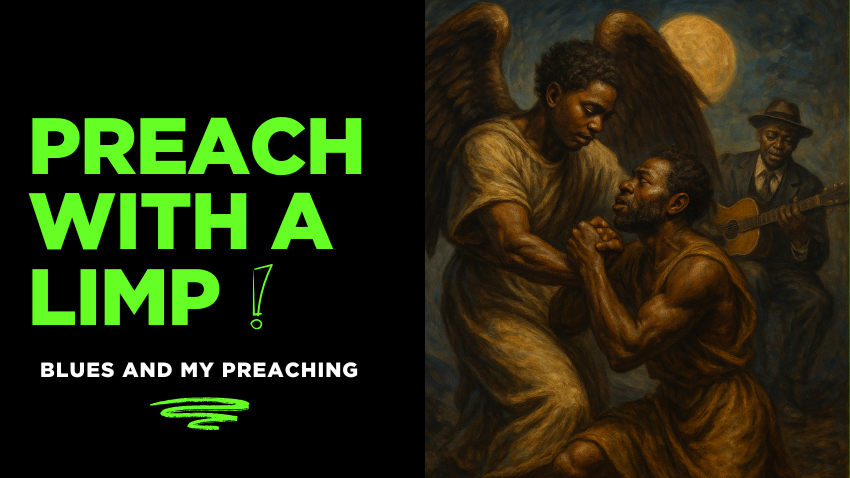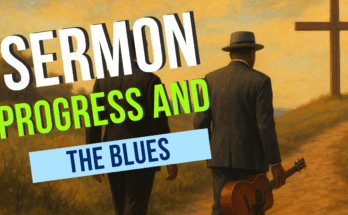As an Amazon Associate I earn from qualifying purchases.
Yes… I’m still thinking about the blues, y’all. And the more I sit with it, the more I realize the blues has made me a better preacher.
When we talk about truth-telling in the pulpit, we usually jump to big theological words or deep exegesis. But the blues reminded me that truth doesn’t always come from books or degrees. Truth rises up from the dirt.
The blues was born in fields and shacks. It came from folks who were scraping by, working themselves to the bone, trying to survive heartbreak. That’s why it speaks with such honesty. And honestly? That’s the kind of preaching we need.
1. The Blues Starts in the Dirt
Blues preaching doesn’t float above real life. It names the sickness, the racism, the job loss, the sleepless nights.
“The blues is the truth set to music,” they used to say.
Job preached like that when he cursed the day he was born (Job 3). And Bessie Smith sang like that when she wailed, “Nobody knows you when you’re down and out.” There’s something about being willing to stand in the dirt, without cleaning it up, that makes the preaching real.
2. No Sugarcoating Allowed
So much of our preaching jumps straight to victory:
“Just hold on and God will fix it.”
But the blues doesn’t let you off that easy. It says,
“I’m holding on… but I’m still bleeding.”
Jesus said the same from the cross, quoting Psalm 22: “My God, my God, why have you forsaken me?” Skip James hit that same note in “Hard Time Killin’ Floor Blues,” where trouble is so heavy you can’t see the way out.
That’s the kind of honesty we need, because our people are fighting unpaid bills, depression, fractured families, and community violence right now. If all we preach is “heaven later,” we miss the God who shows up in the struggle.
3. God Is Not Afraid of the Dark
The blues knows that God can handle your anger, your doubt, your questions. Habakkuk prayed like that when he asked, “How long, O Lord?”
The old spiritual “Sometimes I Feel Like a Motherless Child” carries that same lament. No apologies, just the truth: “A long way from home.” And it’s that kind of honesty that makes room for real hope. God can handle what we’re scared to say out loud.
4. The “Now” Shapes the “Not Yet”
Too much preaching acts like this life doesn’t matter. But the blues says it does. Justice, dignity, joy right now—those are signs of God’s Kingdom breaking in.
Jesus understood that. In Luke 4 He laid out His mission: good news for the poor, freedom for the captive, healing for the broken. Sam Cooke’s “A Change Is Gonna Come” carries that same tension: present struggle and future hope held together.
Jesus didn’t just talk about heaven. He fed the hungry, touched the sick, and called out injustice. That’s the blues approach: you care for the whole person, not just their afterlife.
5. What This Looks Like in the Pulpit
Let lament breathe. Preach like the exiles in Psalm 137 who said, “How can we sing the Lord’s song in a strange land?”
Call out the big sins—the ones we like to ignore. Amos did it when he thundered, “Let justice roll down like waters…”
Tell real stories about real people, the way Jesus did in Mark 5 when He sought out the man everyone else left for dead in the graveyard.
And show that God moves at midnight, not just at sunrise. Paul and Silas sang from jail in Acts 16 before they ever saw the chains break. That’s the same faith you hear in “Trouble in Mind,” with its weary hope: “The sun’s gonna shine in my back door someday.”
When you preach like this, you’re not preaching despair—you’re preaching the whole gospel. And the gospel can handle the dirt.
The Takeaway
I’m not gonna lie… I used to think I was doing this already. I’d talk about “preaching to grandma and ‘dem”. I’d mention real-life issues. I even made sure to “talk about the bad news” so the good news would land harder.
But if I’m honest? I still wasn’t letting the blues touch everything—even what I called celebration. Maybe I just needed to live a little more. Maybe I needed to open my eyes wider to pain and struggle.
The blues has definitely changed me. It taught me to take lament seriously. It showed me that God’s people don’t always dance—sometimes they limp. Just like Jacob did after that long night of wrestling with God:
“The sun rose upon him as he passed Penuel, limping because of his hip.” (Genesis 32:31)
That limp is a reminder. When you’ve wrestled with God and with the real weight of this world, you will not preach the same. The blues leaves a mark. And your people will hear it.
Your Turn
As you prepare this week’s sermon, pause and ask:
Where have I named the pain clearly?
Where have I let lament breathe?
Where am I tempted to wrap things up too neatly?
When you slow down and tell the truth, God will meet you right there in the dirt. And that’s where real hope begins.
Amazon and the Amazon logo are trademarks of Amazon.com, Inc, or its affiliates.






